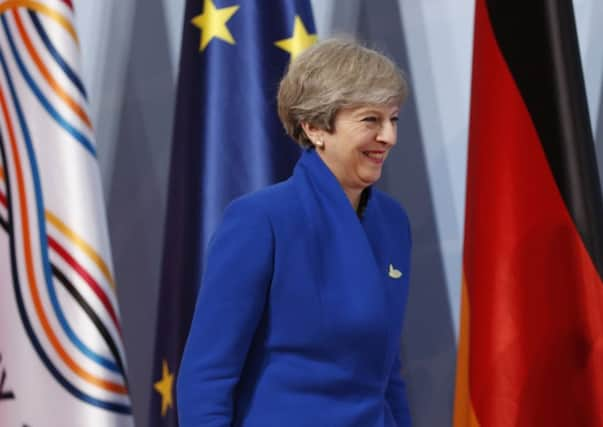Paris Gourtsoyannis: Brexit compromise is a long way off


Less than three months ago, the Daily Mail celebrated news of a snap general election with its now infamous front page, declaring: “Crush the Saboteurs”. Today, on the first anniversary of entering Number 10, Theresa May will implore her opponents for help to deliver her social programme.
Life, as the kids say, comes at you fast.
Brexit was supposed to clear a path for the real project Mrs May took into Downing Street: turning the Tories into a party of the working class and embracing the radical conservatism of Joe Chamberlain, so beloved of her former adviser, Nick Timothy.
Advertisement
Hide AdAdvertisement
Hide AdNow he’s gone and so is her majority, forcing the Prime Minister to go cap in hand to her rivals asking if they would please help her build a legacy from the rubble of her political reputation.
The Conservative manifesto is shredded and Mrs May appears quite happy to borrow what she can from anyone else’s, if it just gives her a vital win on housing or educational equality for white working class boys.
Anything to break up the monotony of what is set to be a barren slog through the next two or three years, with no alternative leadership on the Tory benches, no appetite inside or outside Westminster for another election, and no legislative programme that can command a majority.
Mrs May’s unlikely conversion to consensus politics is in reality an attempt to get ahead of a process that is already building momentum, with or without her.
Even with the DUP propping up the government, its majority is wafer thin, and the hunt is on to find issues that command cross-party support and can be used to embarrass ministers.
The parliamentary arithmetic has effectively installed a shifting group of seven Conservative rebels - the number it takes to inflict a defeat in the voting lobbies - as an unofficial front bench, pulling the strings of government. As with the concession on NHS abortions for Northern Irish women in England, any issue that a handful of Tory MPs feel strongly enough about to dispense with party loyalty will set the Conservative whips running to make an offer.
But despite the Prime Minister’s admission of her own weakness, there is one issue where like minded MPs on opposite sides won’t be able to shift the government, despite overly-hopeful calls for cross-party commissions and compromise.
On Sunday, the incoming Liberal Democrat leader Vince Cable became the first leading political figure to suggest that Brexit might not happen at all - not because the deal would be too hard to negotiate, or that the terms wouldn’t be right, but because the UK’s politics are too fractured to agree to anything.
Advertisement
Hide AdAdvertisement
Hide AdWhile the prognosis may be wishful thinking on Mr Cable’s part, he has correctly diagnosed the illness. In a hung parliament where both of the two main parties are divided on Brexit and any small band of MPs can hold their leadership hostage, there is little scope to deviate from the path the UK is travelling down.
The mediation that needs to happen isn’t between political parties, but within them. The result is paralysis, which is why any hope that Mrs May’s troubles will lead to a softer Brexit deal is a vain one.
Take the current row over Euratom, the European agency that regulates the movement of radioactive material across the continent.
Journalists - and therefore the public and politicians - are only now beginning to wake up to warnings about the impact of pulling out of Euratom.
The Royal College of Radiologists has said that 10,000 UK cancer patients each year could have their radiotherapy treatment directly affected unless a treaty that guarantees the transfer of vital medical isotopes is secured.
When it comes to political ideology, however, doctor does not know best. When Article 50 was triggered, the government signalled it wanted to pull out of Euratom too - because Euratom falls under the jurisdiction of the European Court of Justice.
Few disputes ever end up in front of European judges, but the unwillingness of Brexiteers to accept the oversight of the ECJ over any corner of British law has forced the government to stick inflexibly to its red line.
Cancer patients going without their treatment could normally be expected to produce a prompt government u-turn, and at least nine Conservative MPs have voiced their opposition to leaving Euratom.
Advertisement
Hide AdAdvertisement
Hide AdUnder the current parliamentary arithmetic, that equals likely defeat and a government climbdown, as in the case of Stella Creasy’s push for equal rights to abortion for Northern Irish women.
But on Brexit, the calculation isn’t as simple. When MPs voted on an amendment to the Article 50 bill on Euratom in February, five Brexiteer Labour MPs voted with the government. One of them, Gisela Stuart, is no longer in the Commons, but it’s a reminder that Brexit indiscipline cuts both ways, on both sides of the House.
Another in the shape of a furious contribution from former junior Brexit Minister David Jones - perhaps motivated in part by his sacking just a few weeks ago. Mr Jones said a Brexit that left the UK “subject partly or wholly to the jurisdiction of the ECJ” would constitute “a plot to stymie the clear, unequivocal wish of the British people to leave the EU”.
Eurosceptics have always been the most organised faction on the Tory backbenches. Even if Mrs May wanted to change direction, she’d have little space to manoeuvre.
In continental Europe, a national crisis might have seen a grand coalition to strike a deal that could command broad support. But the UK’s adversarial political culture means compromise tends to be inflicted rather than negotiated. The 2010 coalition was an aberration - it normally takes war to convince political parties to put aside their differences and work together. Don’t expect that to change.